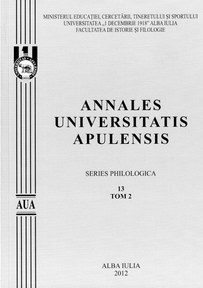Procesul lingvistic evolutiv în concepţia lui E. Coseriu
The Evolutive Linguistic Process in E.Coseriu’s Viewpoint
Author(s): Cătălin NicolauSubject(s): Language and Literature Studies
Published by: Universitatea »1 Decembrie 1918« Alba Iulia
Keywords: synchrony; diachrony; norm; system; speech; language change
Summary/Abstract: In this paper we intend to present the way in which E. Coşeriu conceived the concept of linguistic change. The great scholar brought significant innovation to the way in which this notion was understood, by opposing an original, integralist theory to the positivist and saussurian conceptions. Coşeriu theorized his diachronic ideas starting with the distinction between natural and cultural disciplines. The former study the objects and phenomena of nature, and they try to do so by attempting to discover the causes that lie at their basis. The humanist disciplines, on the other hand, focus upon cultural objects, approached not from the viewpoint of their causes, but from a functional perspective. As the human language is considered a cultural reality, it does not belong to the world of necessity, as natural objects do; instead, it is integrated into a space of liberty, which governs the entire cultural existence of people. This is the reason why Coşeriu studies language from the perspective which is specific to cultural disciplines, considering it not a product (érgon), but a creative activity (enérgeia) and, thus, he approaches it from a finalist point of view. Thus, unlike other researchers of language diachrony, Coşeriu is not interested in discovering the causes that have led to various linguistic changes, but attempts at determining their functions and purposes. Coşeriu believes that three issues connected with the linguistic change should be distinguished, namely, the universal or rational issue, which has to do with the changing nature of all human languages, the general issue, which refers to the general conditions in which linguistic changes take place, and, finally, the historical issue, which focuses on particular changes in particular languages.
Journal: Annales Universitatis Apulensis. Series Philologica
- Issue Year: 13/2012
- Issue No: 3
- Page Range: 311-323
- Page Count: 12
- Language: Romanian

